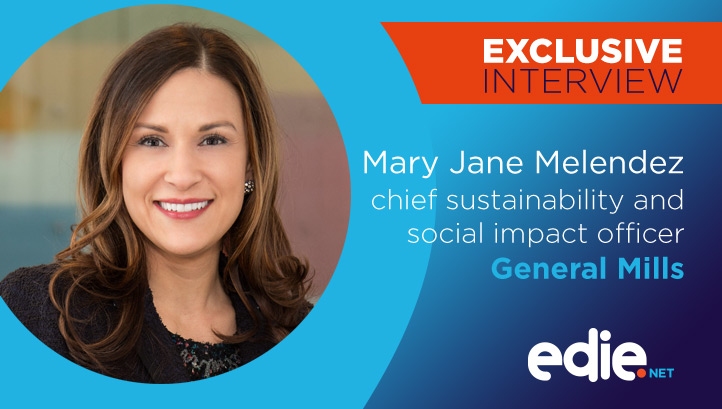Faced with a growing global population and strains on depleted natural resources, US food producer General Mills plans to equip its supply chain farmers with the knowledge and tools to move from practices that mitigate environmental degradation to regenerative approaches.

Melendez believes that regenerative practices will provide benefits for farmers located down the supply chain
Earlier this month, the owner of food brands such as Cheerios, Häagen-Dazs and Betty Crocker committed to implementing regenerative agriculture practices on one million acres of farmland by 2030.
General Mills is using the new target to further bridge the social and environmental aspects of its sustainability strategy. The company believes that regenerative practices – deployed to intentionally enhance the natural resources used by farming communities in its supply chain – will not only create economic and societal benefits for the farmers, but also assist with carbon reduction targets.
Speaking exclusively to edie, General Mills’ chief sustainability and social impact officer Mary Jane Melendez stated that the company has finally uncovered a “true appreciation of the power of nature” through an ability to improve the yields and efficiencies located across the company’s supply chain.
“The way our environment is and how quickly natural resources are being depleted, we understand that nature needs to be rebuilt,” Melendez told edie. “We need to think about how we work more in harmony with the planet to make sure we are regenerating and not just mitigating and reducing our impact. There is such potential to help our farmers in a way that helps the planet.
“Over the past few years, we have made investment into soil health, for example. We were so shocked at the benefits that healthy soil provides to the planet on so many levels. It can sequester carbon, hold more water, increase farmer yields and improve wellbeing and resilience. It’s so powerful.”
As part of the regenerative commitment, General Mills will partner with key suppliers to drive actions that sequester carbon and improve land resiliency across farms that grow its key ingredients, which include oats, wheat, corn, dairy feed and sugar beets. More than $650,000 has been made available to non-profit Kiss the Ground to support farmer trainer through dedicated Soil Health Academies.
Melendez believes that regenerative approaches will assist with General Mills’ ongoing carbon reduction efforts. Only 10% of the company’s carbon footprint is located in its own operations, and a full value chain emissions reduction target of 28% by 2025 (against a 2010 baseline) is in place. As of 2018, General Mills has reduced emissions by 13%, more than its operational carbon footprint.
More broadly, the regenerative approach will help the global food system reduce its carbon footprint – accountable for around one-third of global emissions – and water consumption – accountable for 70% of global use.
Specifically, General Mills is developing measurement science that denotes the benefits of regenerative practices. Techniques like no-till and cover cropping and increased diversity in crop varieties, wild animals and pollinators will be used to improve land resiliency against climate impacts, pests and disease. Below the ground, carbon-rich and healthy soil will be used to clean and store water and assist with the growth of above-the-ground biodiversity.
General Mills has also commissioned Trucost to quantify natural capital risks across its value chain, including agriculture and ingredient production, to identify areas of improvement for the carbon goal. It is estimated that the services ecosystems provide are worth around $125trn a year.
“There are a lot of challenges for farmers and by partnering with mother nature there is incredible potential to address some unknown factors and help mitigate climate change,” Melendez said.
“There’s so much to learn about soil science; hopefully it will help farmers with regenerative practices and their economic vitality. I’m so excited about the opportunity to move to regenerative practices.”
Since 2015, General Mills has invested more than $4m to advance approaches to healthy soil and regenerative practices.
Farmer benefits
But while regenerative approaches to farming will accelerate carbon reduction further, Melendez is excited about the benefits that it will bring to farmers located down the supply chain.
General Mills has a target in place to sustainably source 100% of its 10 top priority ingredients – including palm oil, cocoa and sugarcane – by 2020. As of 2017, 76% of these ingredients were sustainably sourced.
Part of this approach to sourcing is to also improve the livelihoods of the farmers that grow these commodities. For the new regenerative commitment, Melendez claimed that the company was looking to expand the capacity and quantity of training workshops due to their popularity amongst farmers.
Further afield, General Mills has also provided training for 24,700 farmers in Côte d’Ivoire, the largest cocoa growing region, while 52,600 farmers in that country have reported higher incomes through sustainable approaches.
A key aspect of the approach has been collaboration. Melendez noted the importance of working with non-profits to inspire change across the supply chain. As well as joining the World Cocoa Foundation (WCF’s) Cocoa and Forest Initiative to eliminate deforestation with 35 other companies, General Mills also partnered with The Nature Conservancy on a soil health roadmap.
Melendez hopes that collaborative approaches will speed up efforts to reverse environmental degradation and called on other businesses to “be bold” when seeking out opportunities to drive change.
“For us, biodiversity is a business imperative,” Melendez added. “We’re not going to be able to operate without it and it’s a matter of environmental sustainability and business sustainability.
“We don’t have a lot of time to make these changes. It’s important to collaborate and to learn from others in this space and be willing to try new things. Fail fast and keep trying because business needs to operate in ways that are more in harmony with our environment.”
Matt Mace
Source: edie





